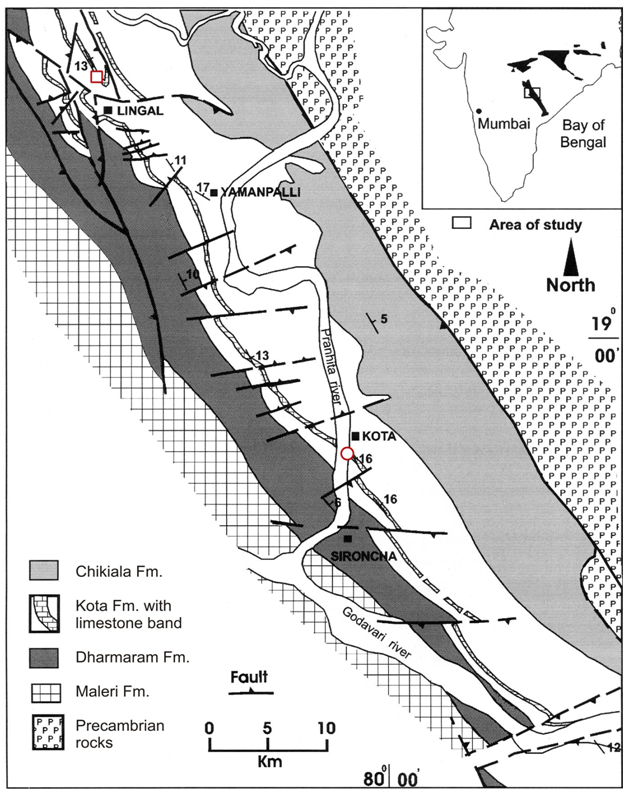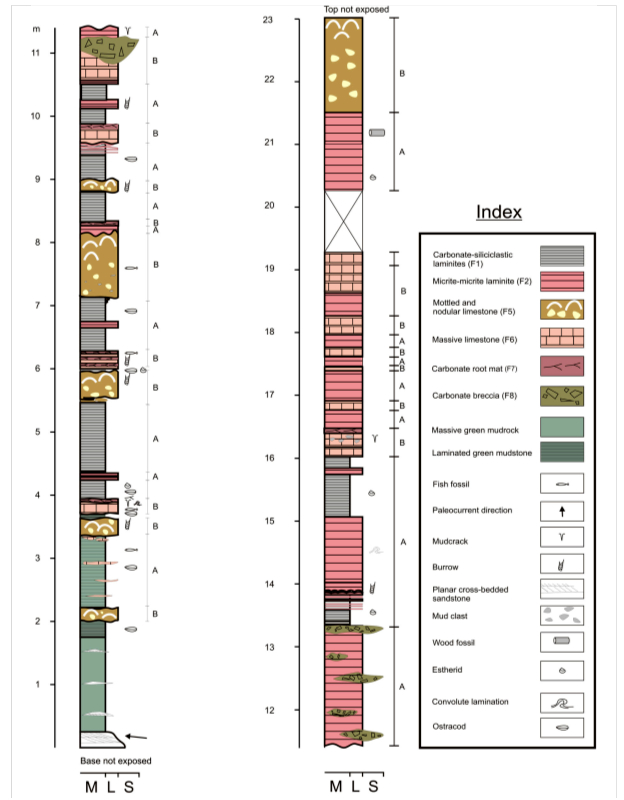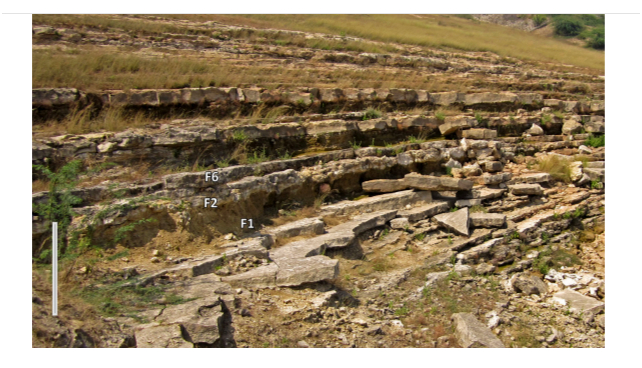Kota Fm
Type Locality and Naming
Pranhita-Godavari Basin: Eastern bank of the river Pranhita, beds dipping 10-15o towards NNE, Sironcha district, Maharashtra. Named by King (1881) after the village Kota located on the eastern bank of Pranhita river a few kilometers to the north of Pranhita confluence with the river Godavari, Kota was earlier grouped with the Maleri as Kota-Maleri 'Stage' by Hughes (1876). Original Publication: Hughes, T.W.H. (1876). On the relations of the fossiliferous strata Maleri and Kota near Sironcha. C.P Records of the Geological Survey of India 9: 63-114; King, W. (1881). The geology of the Pranhita-Godavari valley. Memoirs of the Geological Survey of India 18: 1-151]
[Figure 1: Geologic map of the northern part of the Pranhita - Godavari basin (Bandyopadhyay et al. 2010)]
Lithology and Thickness
Sandstone. The Kota Formation has been divided into lower and upper members (Rudra, 1982). Lower member comprises coarse-grained, hard, compact and pebbly sandstone that grades upwards into fine-grained white sandstone, red and green clays, mudstones and siltstones. Upper member comprises of limestone, alternation of ferruginous mudstones and fine-grained sandstones, argillaceous and ferruginous sandstones and calcareous sandstones (Rudra, 1982). The unit is about 550-600 m thick.
[Figure 2: Lithologs of the Kota Formation in the type section south of Kota village (circle in the geological map) and Lingal village (square in the geological map) (after Goswami et al., 2016)]
[Figure 3: Field photograph of the Kota Formation northwest of Lingal village, Adilabad District, Telangana Adapted from Goswami et al., 2016)]
Relationships and Distribution
Lower contact
Kota Formation unconformably overlies the Dharmaram Fm.
Upper contact
Kota Formation is unconformably overlain by the Gangapur Fm.
Regional extent
Pranhita-Godavari Basin
GeoJSON
Fossils
Following forms are known: Fish: Lepidotes deccanensis (Sykes 1851; Jain 1983), Tetragonolepis oldhami (Egerton 1878; Jain 1973), Paradapedium egertoni (Jain 1973), Pholidophorus kingi, P. indicus (Yadagiri and Prasad 1977), Indocoelacanthus robustus (Jain 1974a), Lissodus indicus (Yadagiri 1986; Prasad et al. 2004), ?Polyacrodus sp. (Prasad et al. 2004); Amphibian: Anura indet. (Prasad 1986); Reptiles: Rebbanasaurus jaini, Godavrisaurus lateefi (Evans et al. 2001), Bharatagama rebbanensis (Evans et al. 2002), ?Teleosauridae (Owen 1852; Nath et al.2002), Indochelys spatulata (Datta et al. 2000), Campylognathoides indicus (Jain 1974b), Rhamphorhynchus sp. (Rao and Shah 1963), Barapasaurus tagorei (Jain et al. 1975; Bandyopadhyay et al. 2010), Kotasaurus yamanapalliensis (Yadagiri et al. 1979; Yadagiri, 1988, 2001), Ornithischia indet., Dromaeosauridae indet., Richardoestesia-like teeth, Theropoda indet. (Prasad and Parmar, 2020); mammals Kotatherium haldeni (Datta 1981), Trishulotherium kotaensis, Indotherium pranhitai (Yadagiri 1984; Prasad and Manhas 2002 [= Indozostrodon simpsoni Datta and Das 2001]), Nakunodon paikasiensis (Yadagiri 1985), Paikasigudodon yadagirii (Prasad and Manhas 1997, 2002), Dyskritodon indicus (Prasad and Manhas 2002), Gondtherium dattai (Prasad and Manhas 2001, 2007), Indobaatar zofiae (Parmar et al. 2013); Insects: Blattoidea, Coleoptera and Hemiptera (Rao and Shah, 1959); Estheriids conchostracans: Cyzicus (Lioestheria) kotaensis (Jones 1862, Tasch et al., 1973) Paleolimnadia sp. (Tasch et al., 1973), C. (Euestheria) crustabundis, Pseudeasmussiata andhrapradeshia, Estherina (Nudusia) adilabadensis, E. (N) indijurassic, E. (N) bullata, E. pranhitaensis (Tasch, 1987); Ostracods: Darwinula cf. D. sarytirmenensis, D. kingi, D. sp., Timiriasevia digitalis, ?Limnocythere sp., ?Stenocypris, Candona sp., Cypridea sp., Eucandona sp., and Clinocypris sp. (Govindan, 1975; Misra and Satsangi, 1979); Charophyte: Aclistochara aff. Jonesi, Praechara symmetrica (Feist et al., 1991; Bhattacharya et al., 1994);
Flora: macroflora - Cladophlebis denticulata, C. indica, C. reversa, Cladophlebis sp., Coniopteris hymenophylloides, Coniopteris sp., Equisetum rajmahalensis, Hausmannia cf. buchii, Sphenopteris sp. Podozamites sp., P. fissum, Ptilophyllum acutifolium, P. cutchense, Ptilophyllum sp., Gingoites lobata, Araucarites cuchensis, Araucarites sp., Brachyphyllum sp., Elatocladus conferta, E. jabalpurensis, E. plana, Elatocladus sp., Pagiophyllum peregrinum, Pagiophyllum sp., Pagiophyllum sp. cf. peregrinum, Agathoxylon kotaense, A. pranhitaensis, A. santalense, Agathoxylon sp., Cupressinoxylon kotaense Ginkgoxylon dixii, P. chandrapurense,P. krauselii, P. rajmahalense, Podocarpoxylon sp., Prototaxoxylon liassicum, Taxaceoxylon sahnii, Taxaceoxylon sp.; microflora - Aequitriradites sp., Cooksonites rajmahalensis, C. variabillis, Coptospora kutchensis, C. microgranulosa, C. verrucosa, Foraminisporis tribulosus, Triporoletes simplex, Baculatisporites comaumensis, Biformaesporites baculosus, Ceratosporites equalis, cf. Appendicisporites sp., cf. Crybelosporites stylosus, cf. Dictyotosporites complex, cf. Kraeuselisporites linearis, Cicatricosisporites hughesii, C. ludbrookii, C. clavus, Concavissimisporites kutchensis, C. penolaensis, C. subverrucosus, Contignisporites cooksoniae, C. multimuratus, Crybelosporites punctatus, Densoisporites mesozoicus, D. velatus, D. harrisii, Duplicisporites problematicus, Foveosporites canalis, Impardecispora apiverrucata, I. indica, Ischyosporites crateris, I. marburgensis, Klukisporites venkatachalae, Leptolepidites major, L. verrucatus, Lycopodiacidites asperatus, L. dettmannae, Matonisporites phlebopteroides, Microfoveolatosporites atbertonensis, Murospora florida, Osmundacidites singhii, Regulatisporites sp., Triletes tuberculiformis, Trilobosporites purverulentus, Araucariacites australis, A. cooksonii , A. ghuneriensis, Callialasporites dampieri, C. segmentatus, C. triletus,C. trillobatus, C. turbatus, Classopollis classoides, Microcachryidites antarcticus, M. mesozoica, Podocarpidites ornatus, P. tripakshii, Agathoxylon kotaense (Rao, Shah, 1963; Mahabale, 1967; Shah et al., 1973; Biradar, Mahabale, 1978; Prabhakar, 1989; Sukh Dev, Rajanikanth, 1988; Rajanikanth, Sukh Dev, 1989; Vijaya, Prasad, 2001; Chinnappa, Rajanikanth, 2016; Chinnappa et al., 2019); Stromatolites Gururaja and Yadagiri (1987); Ichnofossils (Maulik and Rudra, 1986).
Age
Depositional setting
Rudra (1982) interpreted the Lower unit of the Kota Formation as a fining-upward sequence deposited by a laterally shifting meandering river system, while the Upper unit, a coarsening-upward sequence that was deposited in a braided river system. The limestone facies of the upper part was considered to have been deposited in a distal playa-type system of interconnected lakes (Rudra 1982; Rudra and Maulik 1987). The limestone-shale beds of the Kota Formation are interpreted to have been deposited in a freshwater environment, characterized by very shallow water bodies that experienced changes in water level that were repeatedly exposed to subaerial pedogenic processes and produced palustrine deposits (Goswami et al. 2018).
Additional Information
References
Bandyopadhyay et al. 2010; Bhattacharya et al., 1994; Biradar, Mahabale, 1978; Chinnappa et al., 2019; Chinnappa, Rajanikanth, 2016; Datta and Das 2001; Datta et al. 2000; Egerton 1878; Evans et al. 2001 ; Evans et al. 2002; Feist et al., 1991; Goswami et al. 2018; Govindan, 1975; Gururaja and Yadagiri 1987; Hughes, T.W.H. (1876). On the relations of the fossiliferous strata Maleri and Kota near Sironcha. C.P Records of the Geological Survey of India 9: 63-114.; Jain 1973); Jain 1974a; Jain 1974b; Jain 1983; Jain et al. 1975; Jones 1862,; King, W. (1881). The geology of the Pranhita-Godavari valley. Memoirs of the Geological Suvey of India 18: 1-151.; Mahabale, 1967; Maulik and Rudra, 1986; Misra and Satsangi, 1979; Nath et al.2002; Owen 1852; Parmar et al. 2013; Prabhakar, 1989; Prasad 1986; Prasad and Manhas 1997, ; Prasad and Manhas 2001; Prasad and Manhas 2002 ; Prasad and Manhas 2007; Prasad and Parmar, 2020; Prasad et al. 2004 ; Rajanikanth, Sukh Dev, 1989; Rao and Shah 1963; Rao and Shah, 1959; Rudra and Maulik 1987; Rudra, 1982; Shah et al., 1973; Sukh Dev, Rajanikanth, 1988; Sykes 1851; Tasch et al., 1973 ; Tasch, 1987; Vijaya, Prasad, 2001; Yadagiri 1984; Yadagiri 1985; Yadagiri 1986; Yadagiri 1988; Yadagiri 2001 ; Yadagiri and Prasad 1977; Yadagiri et al. 1979;


